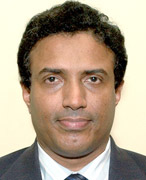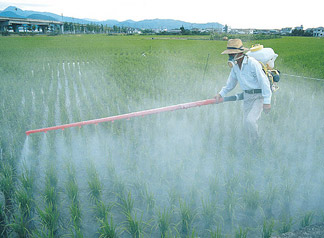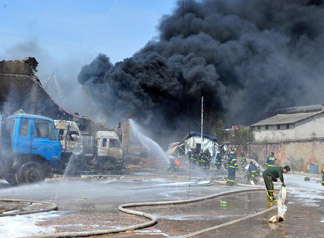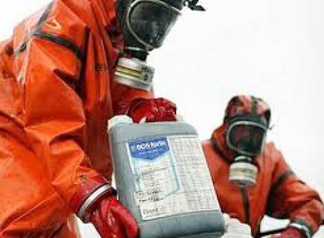|
Safety and security paramount :
Chemical-based industries must be safeguarded
By Ranil Wijapala
A number of chemical -based accidents and pollution to the
environmental were reported recently. The accident at Rathupaswala which
resulted in tragic deaths, the huge fire reported at a warehouse in
Colombo port and the recent incident in Piliyandala where toxic gas
discharged from a detergent manufacturing plant affected residents,
reminds us of the need to give serious thought to chemical- based
industries. It is high time the authorities took stock and took relevant
preventive measures.
|

Dr. Rohan Perera |
According to Dr. Rohan Perera, Director of the National Authority for
the Chemical Weapon Convention attached to the Ministry of Industries
and Director of the Institute of Human Resource Advancement of the
Colombo University,
“This is not only because people are affected due to chemical-based
accidents but also to safeguard these industries which generate foreign
exchange. They must follow guidelines when handling these chemicals “,
he said.
“These industries should not be shut down due to these incidents but
follow guidelines to prevent chemical accidents. This is the primary
task when reacting to chemical -based accidents”, he said.
“We know of an incident concerning a leading company in Sri Lanka
which manufactures and blends laundry detergents, cleaning and
sanitation preparation for textile as well as for consumer use. The
National Authority for the Chemical Weapon Convention(NACWC) also sent a
team to inspect it and to find the reason behind this incident”, he
said.
“We found a large stock of chemicals in the storage facility.
Thio Urea , Ammonia and Tri Chloro Cyonic Acid was stored in the same
place.”, he said.
“During the rainy season there is water movement in the facility.
Water reacts with some of the chemical components which are stored here.
This triggered the reaction between the Tri chloro Cyanuric Acid. With
the reaction with water it releases chlorine gas into the environment.
 |
| Spraying
pesticides not only harms the environment, it causes untold
misery to the handlers as well |
 |
| Environmental
disaster caused by a chemical facility as seen in the picture.
Huge plumes of smoke damaging the environment |
 |
| Safety cocerns
in chemical facilities, a must |
This reaction is highly exothermic and releases a large amount of
heat to the environment and this chlorine triggered the burst of the
ammonia gas cylinder and the ammonia reacted with chlorine and produced
ammonium chloride which forms a white mist which spread throughout the
neighbouring areas in Piliyandala”, Dr. Perera said.
“We have observed that this factory stores a large number of
chemicals which react differently. They have not been separated based on
their reactivity”, he said.
“These chemicals can react with each other at the same spot. The mist
spread because there were no proper storage standards recommended for
industries in Sri Lanka. ”, he said.
The Central Environment Authority (CEA) recommends storage standards
when providing the environmental license for industries in Sri Lanka. It
includes the waste management and storage mechanisms of the chemicals.
The NACWC issues import license.
“In case of an emergency we inspect the industry. We look into the
input and output of the industry, the purpose of the chemical and how
much they produce”, he said.
“If these industries ask for assistance regarding storage or chemical
handling, we help them to keep their industries in the same capacity. We
are not the regulatory body”, he said.
“We need chemicals for industry. Our priority is to safeguard these
industries. Unfortunately those dealing with chemicals do not take
advantage of this facility and even the expertise knowledge to safeguard
the chemical industries”, Dr. Perera said.
These accidents have occurred in the past three to four years due to
the increase in production and increase in demand for consumer products
in Sri Lanka.
A major concern regarding chemical -based industries is the lack of
skilled and responsible people handling these chemicals.
“We ask industrialists to make sure that there are responsible people
handling the chemicals”, he said.
“During inspections we found that people handling chemicals had no
proper knowledge and expertise. They don’t know how to act in case of
emergencies.
They have no idea about the medical aspect and are automatically
exposed to these chemicals. This is the critical situation our
industries face”, he said.
Despite the availability of expert knowledge of locals trained abroad
at the NACWC, these industries do not take advantage of this ability.
Irresponsible and improper handling of chemicals by unskilled and
irresponsible people ends up with accidents compelling industrialists to
shut down industries in the face of agitation. According to Dr. Perera,
President Mahinda Rajapaksa in discussion over the Rathupaswala incident
clearly said that all chemical- based industries must move into the
industrial zones.
“Shifting these industries to isolated areas is one solution. This is
what countries like Korea, Japan and China practise.
They have special industrial zones for industries dealing with the
hazardous chemicals. Unfortunately here if land and building is
available investors open chemical industrial facilities without
informing the relevant authoroties”, Dr. Perera said.
“We came to know about this facility where a large quantity of
chemicals are produced only after this incident”, he said.
But closure is not the solution considering the number of people
losing their jobs and the foreign exchange we will lose after shutting
them down.
“We have to safeguard these industries by implementing a chemical
safety, inculcating a security culture taking into consideration the
health and safety of workers”, Dr. Perera said.
One can imagine the cost Sri Lanka has to pay when workers and people
are affected not knowing the health impact. Sometimes workers handle
chemicals without masks, gloves or any protective gear.
Widespread kidney disease affecting farmers by using large quantities
of chemicals for their farm lands without protective gear is a clear
example. That has resulted in increased expenditure as these farmers
have no health insurance.
“This money spent for them comes from the tax payer. It is just a
tter of wearing a mask or donning a pair of gloves which will cut medicl
costs but farmers are illiterate and are not aware. The NACWC recently
started a chemical weapon safety program to enlighten industrialists.
“We have conducted a series of one- day workshops in collaboration
with the Institute of Human Resource Advancement of the University of
Colombo to make sure that these industrialists are aware how to handle
these chemicals ”, Dr. Perera said. “There is something known as the
boomerang effect. These people are not aware of this effect, it should
be very clearly addressed.” “To safeguard industries, their storage
facilities should be maintained making sure that these type of incidents
do because of the multiple costs involved”, he said.
Another issue Sri Lanka is facing at present is unauthorized import
of chemicals.
Although the NACWC is the authorised agency to approveimport of the
hazardous chemicals , many emergency chemicals are imported by various
means.
“Today chemicals are freely available from India and China where you
can buy anything without a license and can be brought to the country
without legal sanction,” Dr. Perera said.
“If you go to Bankshall Street in Colombo huge chemical storage
facilities available there and you will be surprised to see the extent
to which they are stored. They release chemicals to buyers even without
knowing what the use is.
They just want to sell the chemicals . Even cyanide is sold in kilos
and import emergency chemicals overnight”, he said.
“We found that they were bringing these chemicals in their baggage to
Sri Lanka . There is no mechanism to detect the chemicals. They bring
chemicals at a higher price because customers are ready to pay
exhorbitant rates for emergency chemicals ”, he said.
“The recent incident in the Colombo port is also due to storage of
chemicals and we have to investigate to find out who provided the
license to bring these chemical to Sri Lanka”, Dr. Perera said.
“IThe Organization of Prohibition of Chemical Weapons in Syria won
the Nobel Peace Prize this year for acting for the Chemical Weapon
Safety and Security of the World.
Our organisations must be concerned not only about chemical safety
and the security culture in the country but make sure that it will not
affect industries and the future investment in Sri Lanka in the long
term”, Dr. Perera said. |

